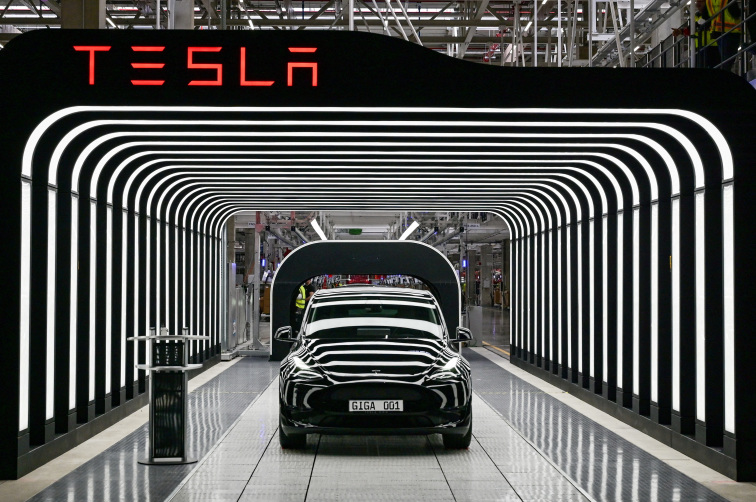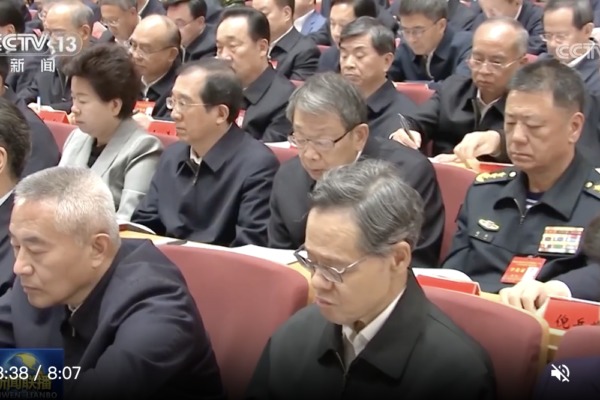Xi Jinping's greatest concern is protecting his family. (People News)
[People News] Even before the White House transitions, Xi Jinping and the CCP are already dreading what’s ahead. The framework of a new era in U.S.-China relations under Trump 2.0 is taking shape, as revealed by recent cabinet nominations. Many observers believe that the Biden administration's strategy of competition, cooperation, and confrontation with China will be firmly replaced, and that a new U.S.-China Cold War will soon enter a heightened phase. Trump’s “epic four-part plan to dismantle the CCP” has arrived.
Part One: A “Dream Team” Cabinet Ready to Crush the CCP
Trump has only four years in this term, and he has learned from his first term’s challenges. He has focused on loyalty, the "America First" principle, and a hardline stance on China as the basis for selecting his cabinet to strengthen the execution of his policies.
Recently, Trump’s cabinet nominations have included a number of prominent China hawks. Senator Marco Rubio has been nominated as Secretary of State, Representative Mike Waltz as National Security Advisor, John Ratcliffe as CIA Director, former Hawaii Representative Tulsi Gabbard as Director of National Intelligence, and Fox News host and veteran Pete Hegseth as Defense Secretary.
This lineup of China hawks has Beijing on edge. Among them, Rubio is no stranger to Beijing, having served as chairman of the Congressional-Executive Commission on China (CECC). He spearheaded the “Hong Kong Human Rights and Democracy Act” and the “Uyghur Forced Labor Prevention Act” to address China’s human rights issues and has called for a national security investigation into TikTok. In 2024, after Huawei announced its Mate 60 phone with a 7-nanometer chip, Rubio urged the Biden administration to issue a chip sales ban against Huawei.
Rubio is still on the CCP’s sanctions list, a significant irony for the regime. Chinese international relations professor Wang Yiwei commented that China would find a workaround, claiming the sanctions target Rubio personally, not the U.S. State Department—essentially, a concession disguised as defiance.
Defense Secretary-designate Hegseth, a veteran who served in the National Guard and was deployed to Afghanistan, Iraq, and Guantanamo Bay, is also deeply aware of the CCP’s intentions. He noted that China is building a military force aimed at defeating the United States. Trump holds Hegseth in high regard, stating, “Pete Hegseth is tough, smart, and believes in America First. With Pete at the helm, America’s enemies should beware. Our military will be great again, and America will never back down.”
Trump’s Chief of Staff Wells and Department of Justice nominee Gaetz are loyal Trump supporters, ensuring Trump’s influence in the judiciary, administration, and both houses of Congress. His firm China policy has put pressure on the CCP and Xi Jinping, though the Chinese government has so far remained outwardly calm. However, in the past five days, the Hang Seng Index has fallen, and the yuan’s exchange rate has neared the 7.3 mark, indicating market instability and underlying nervousness.
Part Two: Lighthizer’s Return with a Possible 60% Tariff Hike
According to a report by the Central News Agency citing Politico, former U.S. Trade Representative Robert Lighthizer has been preparing trade and economic policies for Trump’s first 100 days back in office. Trump may issue an executive order on his first day imposing a 60% tariff on all imports from China. The Wall Street Journal reported on the 12th that Trump has invited Lighthizer to reprise his role as Trade Representative in Trump’s second term.
Lighthizer is known for his hardline stance on China. During Trump’s first term, he conducted a Section 301 investigation on Chinese trade practices, resulting in the "Lighthizer Report" that triggered a tariff war. China’s exports to the U.S. are estimated at around $500 billion annually, and a 60% tariff could generate $300 billion per year for the U.S. Since Chinese export profits do not reach 60%, this measure would severely damage China’s foreign trade and potentially disrupt its entire supply chain.
Chinese media speculate that a 60% tariff could lead to inflation in the U.S., adding pressure on Trump’s economic policies. However, China expects to devalue the yuan and increase export subsidies to maintain its export trade, which could alleviate U.S. inflationary effects. Additionally, Trump’s plans for large-scale energy development and reduced government spending could mitigate inflation significantly.
In response to Trump’s anticipated tariff hike, China’s options are limited. Potential countermeasures include selling U.S. bonds, imposing retaliatory tariffs, and diversifying trade exports. China is actively seeking new markets in the Global South to relieve tariff pressure. Recently, Xi Jinping attended the G20 summit in South America, engaging in diplomatic outreach with Latin American countries to develop trade partnerships as a buffer against Trump’s tariffs. However, China’s Belt and Road projects in Latin America have garnered criticism for creating debt traps. In Brazil, for example, Belt and Road projects have faced pushback.
The Wall Street Journal recently noted that one of Xi’s main motivations for focusing on Latin America and the Caribbean is to isolate Taiwan. Of the eleven countries worldwide that maintain diplomatic relations with Taipei, seven are in this region, including Guatemala, Paraguay, and Haiti. While countries like Honduras and Panama have switched recognition to Beijing and received benefits, China’s aggressive diplomacy against Taiwan has inadvertently raised Taiwan’s profile internationally, gaining it broader recognition and support—a move that has backfired for Beijing.
Part Three: Aligning with Russia Against China—The “Reverse Nixon Strategy”
The Wall Street Journal published an article on November 13 titled “China’s Biggest Nightmare After Trump’s Victory: The ‘Reverse Nixon Strategy’.” The piece discusses how Trump’s win has unsettled Beijing, not only due to his threat to impose tariffs, which could worsen China’s already weakened economy, but also because of a potential strategy shift dubbed the “Reverse Nixon Strategy.”
The article explains that, much like President Nixon sought closer relations with China during the Cold War to counter the Soviet Union, the U.S. may now seek an alliance with Moscow to counter Beijing.
Under the Biden administration, Democrats' strong support for Ukraine pushed Putin toward a strategic partnership with Xi Jinping. This led to a coalition between China, Russia, Iran, and North Korea, forming a new axis that challenges the U.S.-led global order. Xi declared an “unbounded” friendship with Putin, forming a basis for this alignment.
During his first term, Trump tried several times to bring the U.S. closer to Russia, but met resistance from both Republican and Democratic establishment members. The “Russiagate” investigation was used to undermine Trump. After Trump’s 2020 election loss, Putin abandoned hopes for better relations with the U.S., instead launching an invasion of Ukraine to counter NATO expansion and fulfill a vision of “Greater Russia.” Xi used this opportunity to deepen his alliance with Putin, covertly supporting Russia with resources to counter the West.
The Wall Street Journal article notes that “Trump has hinted that his aim is to negotiate with Putin to broker a settlement in the Ukraine war. This alone may keep Xi Jinping and his leadership up at night. A U.S.-facilitated ceasefire could pave the way for improved Washington-Moscow relations, potentially isolating Beijing in the process.”
Part Four: Deterring a Chinese Invasion of Taiwan
Recently, Trump’s comments about Taiwan potentially paying a “protection fee” to the U.S. have raised concerns over America’s Taiwan policy in the coming four years. In contrast, Biden had openly stated multiple times that the U.S. would defend Taiwan in the event of a Chinese attack, leading some to believe that the Trump administration may revert to a more ambiguous stance on Taiwan. On Chinese social media, some pro-CCP voices have suggested that a Trump presidency might provide a “window” for China to act against the Lai Ching-te administration in Taiwan.
The Wall Street Journal cited Yun Sun, Director of the China Program at the Washington-based Stimson Center, who recalled a 2020 speech by former Secretary of State Mike Pompeo. In that speech, Pompeo urged the Chinese people to cooperate with the U.S. to bring change to the CCP. Pompeo’s memoir, Never Give an Inch, circulated among Chinese officials in early 2023 and contained calls for the U.S. to formally recognize Taiwan diplomatically—a message that reportedly angered Xi Jinping. Pompeo and former National Security Advisor Robert O’Brien are not part of Trump’s current cabinet, suggesting that China believes some room for dialogue with the U.S. remains.
However, analysts argue that interpreting Trump’s remarks as a shift in policy or a softening towards China is a misreading. When Trump raised the “protection fee” idea during his campaign, Senator Marco Rubio defended Taiwan, predicting that Trump’s second term would continue supporting Taiwan’s defense against China.
According to Financial Times, Taiwan is considering significant defense purchases from the U.S., potentially including 60 F-35 stealth fighters, four E-2D early warning aircraft, ten retired naval ships, and 400 Patriot missiles. The total deal could amount to $15 billion (around 108 billion RMB). While Taiwan’s Ministry of Defense has denied the report, it underscores Taiwan’s commitment to strengthening its defense—a move Trump’s administration is likely to support. Taiwan’s defense budget already accounts for 2.5% of its GDP, a figure likely to increase. This bipartisan U.S. consensus on bolstering Taiwan’s defense makes a major shift unlikely.
With Trump’s “America First” approach, his cabinet of China hawks, a redefined global strategy, potential de-escalation in the Middle East, and a focus on deterring Russian aggression, the U.S. is well-positioned to concentrate efforts on countering the CCP. These strategies are expected to maintain significant political and military pressure on China, leaving it little bandwidth to initiate any conflict over Taiwan.
(Originally published by People News)










News magazine bootstrap themes!
I like this themes, fast loading and look profesional
Thank you Carlos!
You're welcome!
Please support me with give positive rating!
Yes Sure!